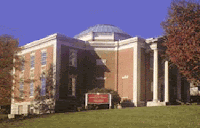 The New York State Department of Education has announced the Documentary Heritage Program (DHP) funding for 2010-2011. DHP is a statewide program established in 1988 and administered by the New York State Archives to ensure the identification, sound administration and accessibility of New York’s historical records.
The New York State Department of Education has announced the Documentary Heritage Program (DHP) funding for 2010-2011. DHP is a statewide program established in 1988 and administered by the New York State Archives to ensure the identification, sound administration and accessibility of New York’s historical records.
One the most important components of the DHP is the grants program. DHP Grants are designed to encourage more comprehensive documentation of New York State*s history and culture by supporting projects that identify, survey, collect, and make available important records relating to groups and topics traditionally under-represented in the historical record. DHP is administered by the New York State Archives.
Eligible applicants include not-for-profit community organizations, archives, libraries, historical societies, and similar institutions within New York State and consortia or partnerships of such agencies. Also eligible are service providers such as historical service agencies, colleges and universities, professional associations, or other not-for-profit institutions or systems that provide services to historical records programs.
A total of $92,000 is expected to be available for grants projects. Grants will be available in amounts up to $25,000. Applicants may seek support for personnel- purchased services, including qualified consultants- supplies- materials and equipment costing less than $5,000- and travel as required to directly support project activities and outcomes.
Grants in this cycle are for up to 12-month projects, from July 1, 2010 through June 30, 2011. Applications must be postmarked by Monday, February 1, 2010. Tentative date for the announcement of grant awards is June 30, 2010.
Grant Project Types
Documentation – The purpose of a documentation project is to identify and ensure the systematic preservation of papers and records not currently in historical records repositories that provide information on the people, groups, events or changing political, economic or social conditions of New York State. A documentation project typically consists of three phases – planning, surveying, and collecting – and usually takes at least two years to complete. Cost sharing of at least 20% is required for Documentation projects.
Arrangement & Description – Arrangement and description are the processes used to obtain physical and intellectual control over materials held in historic records repositories. Arrangement is the process of organizing materials with respect to their provenance and original order, to protect their context and to achieve physical and/or
intellectual control over the materials. Description is the creation of an accurate representation of a unit of archival material by the process of capturing, collating, analyzing, and organizing information that serves to identify archival material and explain the context and records system(s) that produced it. The objective of archival description is the creation of access tools that assist users in discovering desired
records. Cost sharing of at least 50% is required for Arrangement & Description
projects.
Archival Needs Assessment – Historical records repositories undertake needs assessments to evaluate and plan for archival program development. As a result, a comprehensive needs assessment, carried out by an experienced archivist with the requisite expertise, will pinpoint problems, recommend solutions, set priorities, and guide the development
of archival activity. Cost sharing of at least 50% is required for Archival Needs Assessment projects.
Ineligible Projects
Several types of historical records projects are not eligible for funding under the DHP. These include:
* Projects that do not have primary focus on New York State
* Digitization (projects to create digital records)
* Item-level description and/or indexing
* Oral history and/or video taping
* Newspapers (these are not considered to be historical records under the DHP law)
* Preservation (i.e., the physical work to conserve, restore, or repair records, or reproduction for preservation purposes such as microfilming)
In order to insure that the DHP addresses the New York State Historical Records Advisory Board*s mandate to identify, survey, collect, and make available historical records that relate to under-documented groups or subjects, the State Archives has identified and given priority to specific topical areas for DHP funding. These topics are listed in Priority Levels One and Two below. Although applications for projects
that focus on any under-documented group or subject are eligible for funding, they will receive fewer points during grants review than those in Levels One and Two.
Priority Level One
* Population groups in the 20th and 21st centuries
* Economic change in the 20th and 21st centuries
* World Trade Center disaster, September 11, 2001
* Education policy
Priority Level Two
* Environmental affairs
* Mental health
Priority Level Three
* Other under-documented topics in New York State history
Application Process
Grant application forms and guidelines will be available in October 2009. They may be obtained by emailing the State Archives at [email protected] or by visiting the State Archives Web site at http://www.archives.nysed.gov/a/grants/grants_dhp.shtml.
For further information, contact:
Pamela Cooley/Documentary Heritage Program
New York State Archives
Room 9C71 Cultural Education Center
Albany, NY 12230
Telephone: 518-474-6926
Email: [email protected]
 The non-profit Marcus Garvey Memorial Foundation, established in 1961 in New York City, and whose work is informed by the educational philosophy and ideals of Marcus Garvey, is offering two research fellowships on topics related to Africa and the African diaspora, and those related to the Universal Negro Improvement Association, the African Communities League, and/or Marcus Garvey’s organizational activities.
The non-profit Marcus Garvey Memorial Foundation, established in 1961 in New York City, and whose work is informed by the educational philosophy and ideals of Marcus Garvey, is offering two research fellowships on topics related to Africa and the African diaspora, and those related to the Universal Negro Improvement Association, the African Communities League, and/or Marcus Garvey’s organizational activities.




